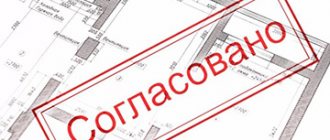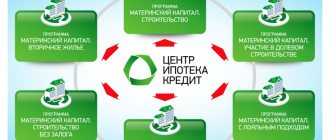Home » Buying and selling an apartment » What documents are needed to buy an apartment
6
Drawing up documents for purchasing an apartment is one of the most responsible processes. The duration of the transaction depends on the speed of collecting certificates, and the accuracy and completeness of the data are the key to security for both parties. The composition of the package of documents will vary depending on the circumstances.
What documents should you have when buying an apartment in a new building?
Buying an apartment in a new building means purchasing only housing that is under construction or completed, but has not previously belonged to anyone. The main difference between such real estate and apartments on the secondary market is the absence of an owner.
Purchasing housing in a new building makes the buyer a co-investor and gives the right to take ownership of the property.
If the apartment is registered as ownership by the developer, its sale is carried out in accordance with the purchase and sale agreement. Such a transaction is equivalent to real estate transactions on the secondary market.
There are several types of documents according to which an apartment in a new building is purchased:
- Participation agreement. This is a document that best meets the requirements for the purchase and sale of housing on the primary market and protects the rights of the Developer and Investor. The drawing up of the contract is regulated by Art. 4 of Law No. 214-FZ of December 30, 2004. The buyer makes material investments in accordance with the established payment schedule, and the executing company transfers the apartment to the shareholder within the prescribed period. The positive point is the established warranty period. If problems arise with housing, the Developer must eliminate the shortcomings (term - 3-5 years for various structural elements).
- Agreement on share contributions in a housing construction cooperative. The essence of the document is to attract funds from investors to Developers, however, the responsibility of the latter is much lower than when registering a DDU. The conclusion of such agreements was possible before 07/01/2018. Amendments to Law No. 214-FZ on the activities of equity holders during the construction of houses, introduced in accordance with No. 175-FZ of 07/01/2018 (clause 8), prevent the possibility of forming housing construction companies and savings cooperatives. Agreements concluded before the specified date are valid and enforceable. The rest have nothing to do with new buildings. The changes do not apply to cooperatives created to implement state housing programs and societies created by defrauded sharecroppers to complete the construction of unfinished facilities.
- Housing certificate. Such securities have not been issued since July 1, 2018, but previously issued ones are valid and give the holder the right to real estate in a facility under construction. Such a document is not linked to a specific apartment, but indicates the acquired square meters. Securities are gradually being phased out because they do not protect the rights of investors.
- Agreement on assignment of rights of claim. The document is drawn up if one party, which has the right to demand the Developer transfer the property, transfers this right to the other party. The least risky transaction is the transfer of the right to claim under the DDU.
When purchasing an apartment on the primary market, you should remember that the safest scheme for purchasing an apartment is through the DDU. Protection of the Investor's interests is guaranteed by Law No. 214-FZ of December 30, 2004.
To conclude an agreement, the Investor must provide the following documents:
- Passport.
- Application for state registration of an equity participation agreement. A lawyer may refuse to assist you in filling out the document.
- Receipt for payment of state duty (Buyer contributes 100 rubles , Developer - 2000 rubles ).
- Participation agreement. Its template is compiled by the legal department of the Developer's company. The investor’s task is to read the document, work out each point with a lawyer, and if they agree, sign the document or discuss changes to some points. The document is drawn up in 3 copies.
The developer must provide:
- Constituent documents. The organizer of shared construction must have: a charter, a certificate of state registration, an individual tax number, an extract from the register of legal entities, a protocol on the appointment of the head.
- Documents for land for construction. It can be rented or owned by the developer.
- Permission to erect a building. It is issued by the municipality. The document contains information about the location and timing of construction.
- Draft object of the contract, description of the apartment. The developer provides documented information about the location of the apartment in the building, its square footage, and location in the building.
- House plan. It reflects the address of the object, number of floors, number of apartments, layout of residential and non-residential premises.
- Insurance contract. Since during construction there are risks of non-fulfillment of obligations, the Developer must issue an insurance contract.
For the first stage of purchasing an apartment in a new building, these documents are sufficient. The agreement will be valid only after it has been registered with Rosreestr. After this, the Buyer can make payments towards the payment of the DDU in accordance with the prescribed conditions. Since 2020, payments are made through special escrow accounts to protect funds from banks and insurance agencies.
After construction is completed (usually the Developer posts information about this on its website), the buyer accepts the apartment. In this case, the Developer must provide a copy of the Decision to put the facility into operation.
The apartment is transferred from the Developer to the Buyer in accordance with the transfer and acceptance certificate. Although the document is drawn up in any form, it has legal force. It should reflect information about the significant and insignificant shortcomings of the apartment, compliance of the area and layout with the parameters stated initially. To correctly present claims, it is advisable that all defects in the inspection sheet be recorded by an experienced foreman.
The act must be signed by the Developer. Thus, he undertakes an obligation to eliminate shortcomings. If the instructions are not fulfilled within the established time frame, the Buyer has the right to file a claim in court.
The next stage is submitting documents to register ownership of an apartment in a new building. The Buyer must obtain information from the Developer:
- on payment of the amount under the DDU;
- cadastral passport for the apartment.
Along with them, Rosreestr is provided with:
- application for state registration of property rights from the Buyer;
- receipt of payment of state duty ( 1000 rubles );
- DDU;
- acceptance certificate in 2 copies;
- from the developer - permission to put the facility into operation.
You can register ownership of an apartment in a new building both at the Rosreestr branch and at the MFC.
What documents are needed when buying an apartment on the secondary market?
Resale housing has several main advantages: a large selection of housing, the opportunity to inspect a finished apartment. The disadvantage is the high risk of becoming an unwitting participant in a fraudulent transaction. There is only one way out - to carefully study the main and additional documents in the process of purchasing real estate.
The transaction will take place in several stages:
- verification of documents;
- execution of a preliminary purchase and sale agreement;
- signing a purchase and sale agreement;
- payment of the cost of the apartment, state registration of the transfer of ownership (the parties agree on the priority in advance);
- execution of the transfer and acceptance certificate;
- registration of transfer of ownership in Rosreestr.
Depending on the circumstances, the collection of documents may affect the postponement of the conclusion of the contract. This happens when taking out a mortgage on real estate, when selling an apartment that belongs to minor children or incapacitated citizens.
Both parties need to prepare for the transaction, and the package of documentation for the owner and the buyer will differ.
From the buyer
The main document required from the buyer when purchasing an apartment on the secondary market is a passport.
To ensure the security of the transaction, it is convenient to carry out settlements by using a safe deposit box. The buyer must take care of drawing up an agreement with the bank on renting a safe deposit box. In the presence of the seller, an amount equal to the cost of the apartment is deposited into it. The seller will have access to the money if the conditions specified in the contract are met.
Read more: How does the purchase and sale of an apartment through a safe deposit box work?
From the seller
You need to obtain confirmation from the resale seller that the apartment belongs to him, and after the sale there will be no other applicants for the property.
The list of required documents includes:
- A document of title, that is, one according to which the apartment has passed into the possession of the current owner. This may be a contract of sale, exchange, gift or another.
- Document confirming ownership. Until July 2020, this was the certificate of ownership (valid to this day). Since 2020, it has been replaced by a certificate (extract) of the Unified State Register of Real Estate, which is issued by Rosreestr after registration of property rights.
- Cadastral passport - contains data on technical changes made to the apartment. You will need it when registering property rights. If the apartment has already been registered in the cadastral register, Rosreestr will make an independent request to receive a cadastral extract from the Unified State Register of Real Estate, which from 2020 is a cadastral passport.
- Technical passport. The document allows you to find out when the house was put into operation, evaluate the main design features, and view the history of the object’s transformation.
- An extract from a personal account, allowing you to establish the presence of debts to pay for housing and communal services.
- An extract from the house register, from which it is clear how many persons are registered in the apartment.
- Contract of sale of an apartment. After inspecting the apartment and checking the documents, you can immediately begin drawing up the Basic Agreement, which must comply with the provisions of Art. 549-550 Civil Code of the Russian Federation. The document is drawn up exclusively in writing. Notarization is required in the case of purchasing an apartment by co-shareholders or a minor, incapacitated citizen. In other cases, it is advisable, but not necessary, to certify the contract.
By agreement of the parties, a preliminary purchase and sale agreement, or the so-called “pre-agreement” (PDCP), can be concluded. By default it is valid for 1 year, but by agreement it can have a shorter validity period. The conditions specified in it can be discussed and changed.
If you do not agree to fulfill the obligations of the PDKP, the issue is resolved in court. The agreement can include information about making a deposit. The latter will perform both a payment function (that is, be included in the cost of the property) and a surety function, that is, an incentive to fulfill obligations. If the Buyer refuses to comply with the PDCP, the deposit is not returned to him, and if the Seller is the violator, the deposit is returned to the Buyer in double amount.
Read more: Agreement on deposit when purchasing an apartment
Actions to ensure transaction security
Due to the increasing number of fraudulent schemes, the buyer has the right to demand other documents and independently verify their authenticity.
It is possible that an heir from among distant relatives will claim the apartment. To avoid this, you should contact a notary to obtain a certificate of absence of heirs.
The seller should ask for a certificate from the housing office confirming the absence of debt.
A thorough study of documents on property rights will reveal records of seizure of property and other encumbrances under which the transaction cannot be carried out.
The buyer should look at the compliance of the apartment layout with the technical documentation. Often the Seller is silent about illegal redevelopment, and having bought such an apartment, you may encounter difficulties in its further sale.
Both parties are advised to check the authenticity of notarized powers of attorney, since fraudsters often act on behalf of citizens who are unaware of the alienation of their apartment.
What to submit to Rosreestr
After completing the contract, you should contact Rosreestr or the MFC branch with the following documents:
- passport;
- application for state registration;
- purchase and sale agreement;
- title documents for the apartment;
- cadastral passport;
- receipt of payment of state duty (the buyer pays 2000 rubles )
You can register ownership of an apartment through the State Services portal. In this case, the user must register in the ESIA system and have an enhanced qualified electronic signature. The cost of registration will be 30% lower ( RUB 1,400 ).
After registration, the transaction is considered completed. The average registration time is 7-9 days , after which an extract from the Unified State Register of Property Rights is issued.
Features of the housing privatization procedure
Housing owned by housing cooperatives can be privatized only if the entire share is paid. After this, you can begin registering ownership of the property. The peculiarity of such privatization is that the real estate was not owned by the state. Such real estate can only be registered in the name of a shareholder.
Housing is provided to military personnel during their service in the armed forces. After retirement, a military man has the right to privatize an apartment. Moreover, all family members participate in privatization. The exception is apartments located in closed military camps.
What are the regulations for the privatization of residential premises in dilapidated buildings? According to Federal Law No. 1541, apartments in dilapidated buildings are not subject to privatization. But if the housing is dilapidated, that is, its wear and tear is more than 70%, then such real estate can be privatized.
To pay for services provided by various organizations when preparing documents, you can use the “Calculation” system or through ERIP.
The system provides the ability to pay in cash, electronically, or using a bank card.
You can make a payment at an ATM, bank teller, or via the Internet. Some intermediary firms provide the opportunity to privatize housing in installments.
You can submit an application for privatization of real estate through the State Services portal. To do this you need to register on this site.
The entire package of documents that must be submitted during a personal visit is attached to the application. All privatization participants at the MFC must sign the agreement.
Privatization of real estate has its pros and cons. It is necessary to weigh all the pros and cons for your specific case.
If you decide to transfer your home into ownership, you can do it yourself when visiting the MFC, by transferring documents online through the State Services website, or provide this process to special real estate agencies by paying for the service.
Sometimes people are afraid to privatize housing on the grounds that it seems to them that after privatization, they will pay more for it. But now this is not the case. The Law on Privatization states: “Owners of privatized residential premises in communal apartments pay on equal terms with tenants of residential premises in the state or municipal housing stock for social use, costs associated with the maintenance and repair of common areas of communal apartments and common property in an apartment building.” .
These payments, in essence, are a gentle tax on real estate.
However,... In our life, obviously, we simply cannot do without these “howevers”.
The fact is that the Government has long been preparing a bill, according to which we will have to pay this property tax based on its market value. And this can be just terrible.
In order to privatize housing, the consent of all family members is required. In this case, the opinion of not only adult family members is taken into account, but also children aged 14 to 18 years, as well as temporarily absent family members.
Often, those who are absent are forgotten, or they simply want to forget. For example, as a rule, they “forget” to ask the opinion of former spouses who moved after a divorce but continue to be registered in this home.
A person can agree to privatization, but not participate in it. This means that it will not appear on the privatization certificate.
Everything here seems simple and clear. But there is one pitfall that can break the boat of the existing way of life.
The fact is that this person retains the right to a part of the other privatized premises received by these people in exchange for the previous one. In other words, if the same notorious spouse who agreed to the privatization of an apartment from which he left a long time ago continues not to live in it, then this is normal.
Privatization is contraindicated for people who are crowded in large numbers into a tiny municipal apartment.
The fact is that when a family living in a rented municipal apartment is resettled, everyone is entitled to a certain amount of space in the new apartment provided to them in return. For Moscow, for example, this is at least 18 meters per person.
Those same citizens who have five of them huddling in a small one-room privatized apartment are required by law, in the event of resettlement, to be provided with equivalent living space.
A privatized apartment can bring surprises of a different kind.
For example, here is a real situation. Elderly parents want to leave their apartment as an inheritance to their son. To do this, they privatize it.
This is the wrong move, because their son, even if he lives separately with his family but is registered with them, after their death will remain the tenant of this living space and will be able to privatize it. But if the parents themselves privatize it, then after their death other legal heirs may appear. For example, children from a first marriage.
But if they did privatize, then let them write the correct will.
Additional documents depending on the specifics of the transaction
Each transaction requires special consideration, since with the wrong approach to paperwork, the purchase and sale process will drag on indefinitely. There are a number of circumstances in which the above list of certificates should be supplemented.
The apartment is purchased by one of the spouses
The consent of the spouses is not required for small household transactions, but when it comes to the purchase and sale of real estate, obtaining the written consent of the husband (wife) for the sale of an apartment is mandatory (Article 35 of the RF IC).
The spouse's consent must be notarized. Subsequently, the document is submitted to Rosreestr.
There are exceptions to this rule. If the apartment belongs exclusively to the owner, that is, it was donated, inherited or privatized by one of the spouses with the refusal of the other, then consent is not required. Read more: Refusal of a share in a privatized apartment
Difficulties are raised by the question of the need for a document when spouses divorce. The answer is clear: if there is no marriage contract according to which the property belongs to one person, or the property has not been divided, then consent is required.
Do you need the consent of your wife (husband) to buy an apartment? The answer is yes, because the family budget is spent, and the other party can challenge the deal. However, this condition is not necessary, since it is not related to the disposal, but to the acquisition of property.
Documents for purchasing with a mortgage
A special feature of the transaction is the buyer’s attraction of borrowed funds. In this case, the bank must provide documented information about the direction of the loan.
Since a purchase and sale agreement cannot be concluded in the absence of money, the parties draw up a PDCP. When contacting the bank you will need:
- preliminary agreement CP;
- certificate of the cost of the apartment;
- real estate insurance contract;
- other documents in accordance with the lending policy of the financial institution.
Banks have a strict list of documents for issuing a mortgage. It may vary, so it is advisable to create a complete list under the guidance of a bank employee.
When registering a mortgage, the agreement must be registered with Rosreestr. To do this, submit the following documents:
- Application from the Buyer and from the financial institution for mortgage registration (drawn up together with a bank employee).
- Receipt for payment of state duty. The buyer pays: 1000 rubles. — for registering the purchase of an apartment, 500 rubles. - for registering a mortgage. The bank pays a state fee of 2000 rubles.
- Mortgage agreement. It contains information about real estate that remains with the bank as collateral until the mortgage is paid off. The document is drawn up by an employee of the financial institution.
- Loan agreement. Provided by the bank. It contains all the terms and conditions of the loan.
- Consent of the spouse to purchase an apartment with a mortgage.
When conducting a transaction, the client can use the support of the bank’s legal department or contact a private lawyer.
The seller’s task is to wait for the loan to be processed and to make sure that the content of the contract includes a clause about paying part of the cost of the apartment through the loan.
Buying an apartment using capital
According to Art. 7 of Law No. 256-FZ of December 19, 2006, maternity capital funds can be used to improve housing conditions. This means that the family has the right to purchase separate housing (apartment, house), which will improve the quality of life of family members.
The peculiarity of the transaction is the payment of part of the cost of the apartment not in cash, but by bank transfer from the Pension Fund account to the buyer’s account. This is also indicated in the purchase and sale agreement.
After purchasing an apartment with MK funds, it is necessary to allocate shares to minor children.
Transaction involving a minor
There are several possible situations to consider:
- An apartment with a minor's property share is for sale. In this case, the buyer must obtain the consent of a child who has reached the age of 14 to sell, as well as obtain permission from the guardianship and trusteeship authorities to alienate the property. To protect the property rights of children, a sale is possible only on the condition that the child is allocated a share in another home, and its size and square footage cannot be less than the previous one. The mother and father of the child must apply for permission with a corresponding application. The document processing period ranges from 2 weeks to a month.
- An apartment is for sale where a child lives, but is not the owner. Then permission from the guardianship authorities for sale will not be required.
- An apartment is purchased in the child's name. If a parent acts on behalf of a minor ( under 14 years of age ), the contract states that the transaction is made in the interests of the minor. When a child reaches the age of 14-18 years , he can act independently, having received written consent from the parents to complete the transaction.
When buying and selling real estate, birth certificates of children are provided to government agencies.
After privatization of the apartment, where to carry the documents?
For a citizen who has already taken part in such a process, the following is additionally submitted:
- Certificate form No. 2. It turns out in BTI;
- Extract of form No. 3 from the Unified State Register.
- Extended extract from the house register;
Personal documents:
- Marriage certificate.
- Passport of a citizen of the Russian Federation.
Original and photocopy (spreads with full name and registration must be on one sheet; if, due to the number of registration stamps, the photocopy does not fit on one sheet, notarization will be required); - Death certificate of family members who previously lived in the apartment (original and notarized photocopy);
Important If the procedure is carried out through an authorized person. Third stage To obtain an extract from Rosreestr you need:
- Passports for the apartment - technical and cadastral;
- For adults - a passport, for a child - a birth certificate.
- Social tenancy agreement or order;
What documents does the buyer receive upon completion of the transaction?
After completing the transaction, the seller may need to:
- copy of DDU;
- real estate purchase and sale agreement;
- a copy of the title document for the apartment.
In the primary real estate market, the buyer receives the following documents:
- equity participation agreement (original), assignment of claims;
- payment receipts;
- act of acceptance and transfer;
- EGRN extract.
The buyer of real estate on the secondary market remains with the following documents:
- contract of sale;
- USRN extract;
- act of acceptance and transfer;
- seller's receipt of money.
The documents provided will allow the buyer to receive a personal income tax refund due when purchasing a home; register property rights; register at your place of residence, re-register meters for gas, electricity, water; register your home for tax purposes.
To underestimate the stage of collecting documents means approaching the transaction “blindly”, naively trusting the participants in the real estate market. This is fraught with material losses. The buyer risks losing the property if it turns out that it was under arrest or pledged, distant relatives are entitled to it, or it is the subject of a legal dispute.
To prevent this, you need to find out: what documents should be required from the seller? What should you pay attention to? How can I find out if I have arrears for utilities? How to detect fake documents? Ask questions to a lawyer at ros-nasledstvo.ru and get a free consultation.
FREE CONSULTATIONS are available for you! If you want to solve exactly your problem, then
:
- describe your situation to a lawyer in an online chat;
- write a question in the form below;
- call Moscow and Moscow region
- call St. Petersburg and region
Save or share the link on social networks
(
1 ratings, average: 5.00 out of 5)
Author of the article
Natalya Fomicheva
Website expert lawyer. 10 years of experience. Inheritance matters. Family disputes. Housing and land law.
Ask a question Author's rating
Articles written
513
- FREE for a lawyer!
Write your question, our lawyer will prepare an answer for FREE and call you back in 5 minutes.
By submitting data you agree to the Consent to PD processing, PD Processing Policy and User Agreement
Useful information on the topic
1
Notarized consent of the spouse to purchase an apartment with a mortgage
Buying an apartment with a mortgage (on credit) is quite a responsible...
2
Do you need a realtor when buying and selling an apartment?
Buying and selling an apartment are dangerous transactions. Despite…
3
Purchasing an apartment that has a mortgage or collateral from a bank
Buying a mortgaged apartment secured by a bank will cost less than...
11
Preliminary agreement for the purchase and sale of an apartment with and without a deposit
When purchasing real estate on the eve of execution of the Main Agreement, the parties can conclude...
26
Termination of the apartment purchase and sale agreement
The desire to terminate the purchase and sale agreement (SPA) of an apartment may arise for various reasons...
20
What you need to know when buying an apartment on the secondary market
Before purchasing an apartment on the secondary market, you need to know the procedure for concluding...









